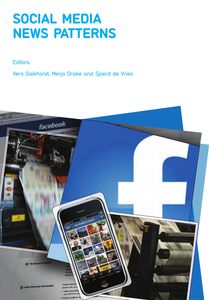A social media architect is an appealing new profession that entails crossovers between communication and IT & Design. There are no study programmes for this job. Important questions are how to interest secondary school pupils for such a new job, and how to prepare them for these jobs or jobs that do not even exist today? This research aims to set an example by presenting a realistic job profile of a social media architect by linking the ‘21st century skills’ to the context in which he/she operates.
DOCUMENT

Wereldwijd onderzoek: Hoe gebruiken nieuwsmedia social media? Jongeren lezen geen krant meer, ze kijken op hun smartphone die ze altijd bij de hand hebben. Binnen het lectoraat social media en reputatiemanagement van NHL hogeschool te Leeuwarden heeft een groep internationale studenten in 12 landen onderzoek gedaan. Hierbij hebben ze meer dan 150 social media sites bestudeerd van nieuws media. De resultaten maken deel uit van een internationaal onderzoek van NHL Hogeschool en Haaga Helia University. De onderzoeksvraag was: Wat speelt zich af in de nieuwsmedia? Persbureaus kunnen het overzicht gebruiken om hun social media te optimaliseren. En voor ieder die journalistiek een warm hart toedraagt is het interessante informatie over de nieuwsmedia in een overgangssituatie (2nd edition)
DOCUMENT

Een van de belangrijkste ontwikkelingen in het onderwijs is het gebruik van nieuwe kennismedia: media voor het genereren, begrijpen en delen van kennis. Denk aan social media, serious gaming, apps, tablets en smartphones. De grote vraag is: hoe ga je als school om met deze mediaontwikkelingen? In dit whitepaper presenteren we de roadmap van ons onderzoek naar de educatieve implementatie van de iPad (Engelstalig document)
DOCUMENT

A unique testing ground where the creative sector and education work together to better understand the possibilities around volumetric video capturing. Within a volumetric studio, dozens of cameras capture all the movements of a living subject simultaneously. These recordings are converted into a fully moving and digital image, which results in an image that is barely distinguishable from reality. Chronosphere gives content creators and scientists the unique opportunity to experiment with volumetric capturing, using the newest volumetric studio within De Effenaar. There is room for a total of twenty projects, and proposals can be submitted.Partners:De Effenaar 4DR Studios Wildvreemd Natlab 360 verbeelding Dutch Rose Media Hyperspace Institute Fontys Hogescholen TU/e Center for Humans & Technology
Craft your own audience: How can a technology-driven company use online gaming communities, like Minecraft, to reach and engage a young audience? This project creates a context in which reality is simulated, by having students work together for a real client in an international context. In this project we explore innovative ways in which Samsung can engage younger audiences through Minecraft, the world's best-selling game with almost 140 million monthly players (2023). This project is focused on on educating, researching and developing playable prototypes within Minecraft that demonstrate how online gaming communities can be used to connect technology companies with a new generation of users. Societal issueInclusion of different ages around technology literacy and education (21st century skills).Benefit to societyGlobal inclusive community around education and R&D, higher cultural awareness.Collaborative partnersManchester Metropolitan University; Samsung Benelux.
The growing use of digital media has led to a society with plenty of new opportunities for knowledge exchange, communication and entertainment, but also less desirable effects like fake news or cybercrime. Several studies, however, have shown that children are less digital literate than expected. Digital literacy has consequently become a key part within the new national educational policy plans titled Curriculum.nu and the Dutch research and policy agendas. This research project is focused on the role the game sector can play in the development of digital literacy skills of children. In concrete, we want to understand the value of the use of digital literacy related educational games in the context of primary education. Taking into consideration that the childhood process of learning takes place through playing, several studies claim that the introduction of the use of technology at a young age should be done through play. Digital games seem a good fit but are themselves also part of digital media we want young people to be literate about. Furthermore, it needs to be taken into account that digital literacy of teachers can be limited as well. The interactive, structured nature of digital games offers potential here as they are less dependent on the support and guidance of an adult, but at the same time this puts even more emphasis on sensible game design to ensure the desired outcome. The question is, then, if and how digital games are best designed to foster the development of digital literacy skills. By harnessing the potential of educational games, a consortium of knowledge and practice partners aim to show how creating theoretical and practical insights about digital literacy and game design can aid the serious games industry to contribute to the societal challenges concerning contemporary literacy demands.